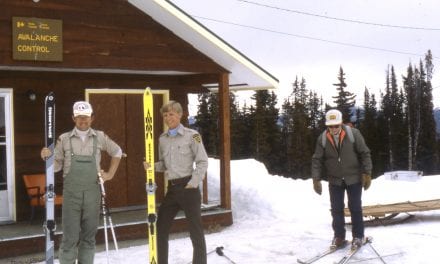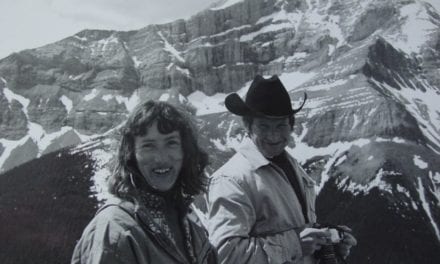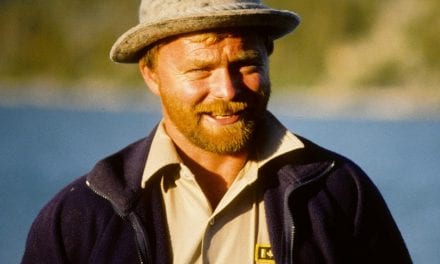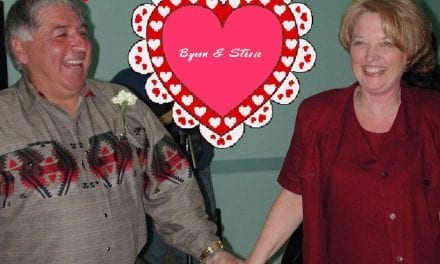This Oral History interview was funded in part by a research grant received in 2022 from the Government of Alberta through the Alberta Historical Resources Foundation.
Park Warden Service Alumni Society of Alberta
Oral History Project Phase 12 – Winter 2022
Telephone Interview with A.L. Horton
December 22, 2022 – 10:00 am MST
Jasper, Alberta and Invermere, BC
Interviewed by Susan Hairsine
SH: What was the place and date of your birth?
AL: I was born in Vegreville, January 1965.
SH: You’re just a young’un.
AL: Yes, still not even sixty.
SH: I have to ask what does A.L. stand for?
SL: Andrew Leslie. I was named after my grandfather. There’s an A.L. Horton Junior High School, (at least it was a junior high when I went there), in Vegreville.
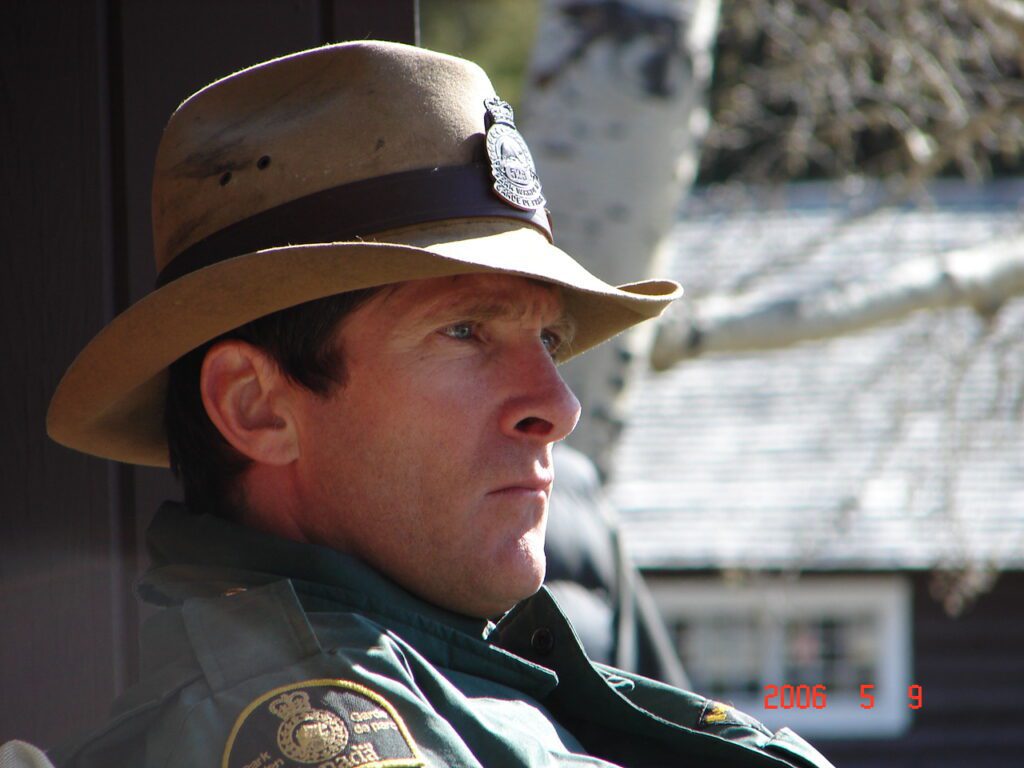
SH: Where did you grow up?
AL: Vegreville.
SH: So the whole time in Vegreville?
AL: Yes
SH: How did you become involved in the Warden Service? Which national park did you start working in?
AL: I was working for Alberta Environment in the winters, and I ended up working with Ron LeBlanc when he was on a seasonal layoff from Parks. He was working as a wildlife technician as well. He told me that there was going to be a warden competition and that I should apply on it. I had two sisters who had worked for Parks before as lifeguards and they always said that the Warden job was really great. So I followed Ron’s advice and applied on a GT 1 interview in 1989, and was interviewed by Al Westhaver and was offered a job.
SH: What national park did you start working in then?
AL I was a campground cowboy in Banff.
SH: I remember that actually. What made you want to join the Warden Service?
AL: When I was a kid my dad took us to a provincial park north of Vegreville…Moose Lake, and he knew the Ranger there. I think I was maybe five or something. The Ranger took us for a drive around in this big four wheel drive truck, and took us out on a boat, and kind of showed us around the park, and at that age I thought that was an awesome job to do, so that kind of became the goal of my life, to work somewhere in the resource field.
I initially wanted to be a Fish and Wildlife officer because I was really about catching poachers when I was young, but the Warden Service was the only place that would take somebody that was colorblind like me.
SH: So growing up, were you guys quite an outdoors family AL?
AL: When we could, yes. My dad ran the newspaper so he was pretty tied up all the time, but whenever we could get out, we’d go. He wasn’t a big game hunter but he was a fisherman and a bird hunter, so I always got a lot out of those times when we’d get to go hunting or fishing.
SH: What different parks did you work in? How did they compare? Do you have a favorite?
AL: I worked in Banff in ‘89, Elk Island from 1990 to ‘93, and I went back to Banff in ‘93, and I went out to Gwaii Hanaas for a season in ‘99, back to Banff in 2000 and then moved up here to Jasper in 2004. I really enjoy living in Jasper but I think my best times were in Banff.
SH: So one’s a mountain park, a prairie park and a water park, but you tell me … how did they compare with the various jobs that you did?
AL: Well, Elk Island was amazing because you were given so much responsibility. I was a GT1 or a GT2 I guess then. I got to run actual wildlife programs; elk trapping, plains bison handling and that sort of thing in the three years that I was there. So you get a lot of really good experience, higher level experience than you’d be able to get in a big park. Working in Banff I also had a really wide variety of responsibilities there as well, so I can’t really knock Banff that’s for sure. I really enjoyed the people there. When I came to Jasper, kind of the same thing, but I had started to climb the ladder a bit so it was a little bit more narrow in my niche, but I managed to work my way up into a supervisory positions in Jasper. Out on the coast, I was only there for about 8 months, I was just getting my feet wet literally, learning how to run the boats, and I was to write the law (enforcement) plan which was kind of funny there because they’d only had about ten law enforcement occurrences since the park had been open. There was not a lot there to work with.
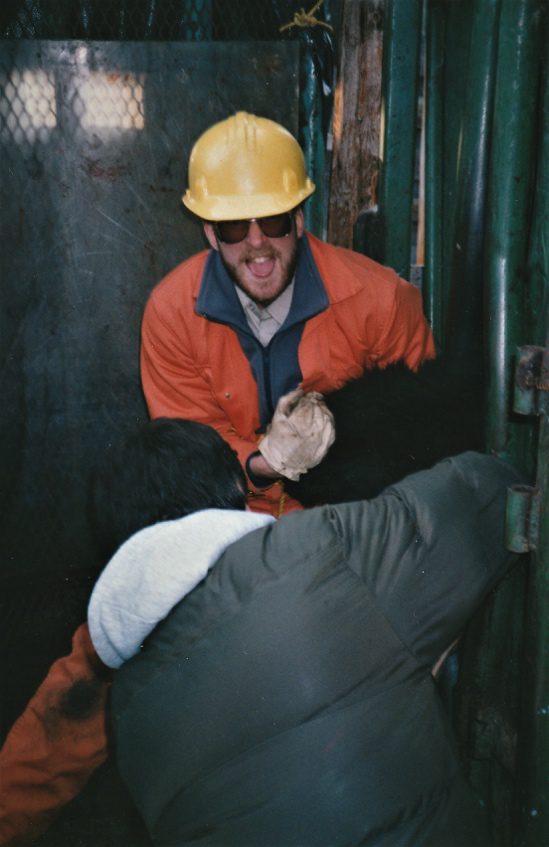
A.L. handling Bison – Elk Island National Park.
SH: So go back to Banff and Jasper. What were your responsibilities there? I remember you being “Stinky” the abattoir guy.
AL: Oh yeah. Well when I came back to Banff from Elk Island, I was stationed out at The Crossing (Saskatchewan Crossing) for a couple of summers, which was great, one of the highlights of my career. Then I came into town and worked frontcountry for a winter, and then went into backcountry where I was in the Bryant District with Tom Davidson for a couple of years. Then I went to wildlife and worked with Tom Hurd, and got to do a bunch of stuff with him; wolf darting with Norcross and Hebblewhite, and bear trapping with Rob Seroya, black bear trapping and some grizzly bear trapping as well down the Spray. Some elk handling with Todd Shury, so there were a lot of fun jobs there in the wildlife shop. Then I was acting ‘Pro Ops Supervisor’ and scheduler, and court warden with Hillary (Husar). Then I did that brief stint at Gwaii Hanaas, patrols in the summer and working on the law (enforcement) plan in the shoulder seasons.
In 2000, a GT3 position opened up in Banff so I started that winter in the Backcountry. Ian (Syme) called me the ramrod, but I was the basically the coordinator for backcountry. I started working winters for Tim and the public safety team doing avalanche forecasting and avalanche control.
SH: At Sunshine or Norquay or where?
AL: Back then we didn’t really do ski hills, we just did the roads, so we did Sunshine Road, the Trans Canada and 93 South.
When I came up here (Jasper) in ‘04, I went to Sunwapta initially and became the Backcountry Supervisor for a couple of years (05-06), and then moved back to Sunwapta (2007) as the manager of the station. And when the Sunwapta Station got mothballed in 2010, I came into town and became a Visitor Safety Specialist, and that’s how I ended my career.
SH: So public safety at the end of your career in Jasper, what were some of your main responsibilities there?
AL: Well, you know I never had any of my mountain guide certification, so even though I was working at a visitor safety specialist level, I wasn’t one that would be leading technical rescues, so I kind of had to find a niche for myself. I found where I could be the most helpful was as an Incident Commander on technical rescues because I knew everything that was happening out there and what they’d need and could plan ahead, so that’s the role I took on mostly. I could run smaller non-technical rescues on my own, but for the larger ones I’d deflect to the expertise of the guides. I also took over the swift water rescue portfolio, explosives and was pretty active in the avalanche control program.
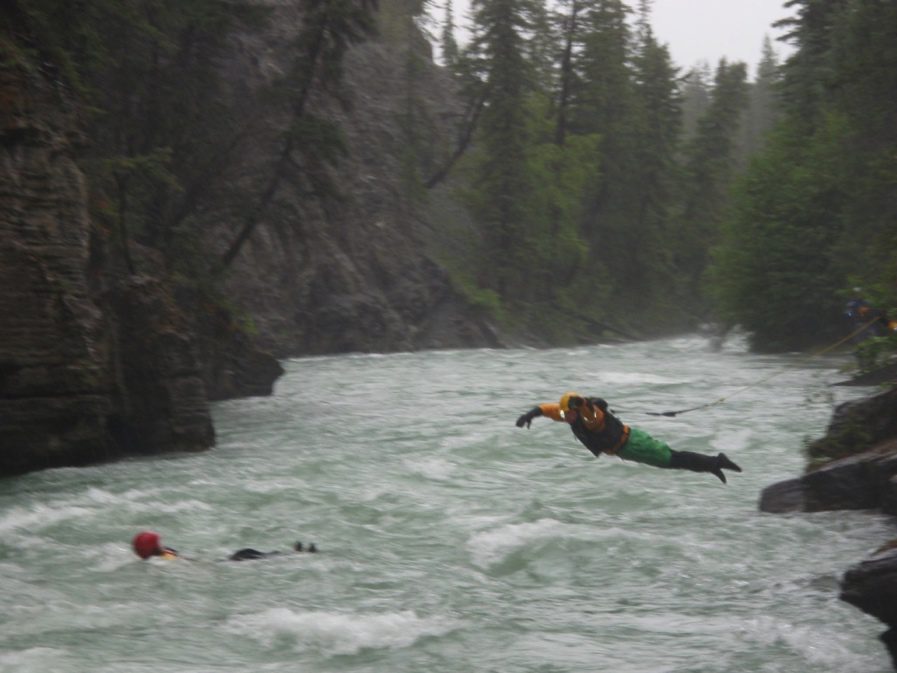
Swift water rescue training, Jasper National Park.
SH: Do you want to talk about some of your other main responsibilities over the years?
AL: I guess getting the Backcountry Supervisor job here was pretty great. I don’t know how it happened but somehow I managed to avoid the shut down of the backcountry here. So the whole backcountry program just kind of dissolved, just evaporated, around 2008 or 2009 but by that time I had switched back over to being the Manager of Sunwapta so I avoided being stuck without a job. So I was pretty lucky, but I did enjoy the two years of working backcountry here. It was kind of great even though I didn’t get to be a district warden here, but because I was a supervisor I got to travel all the districts so in a short period of time I got to see the whole backcountry of the park.
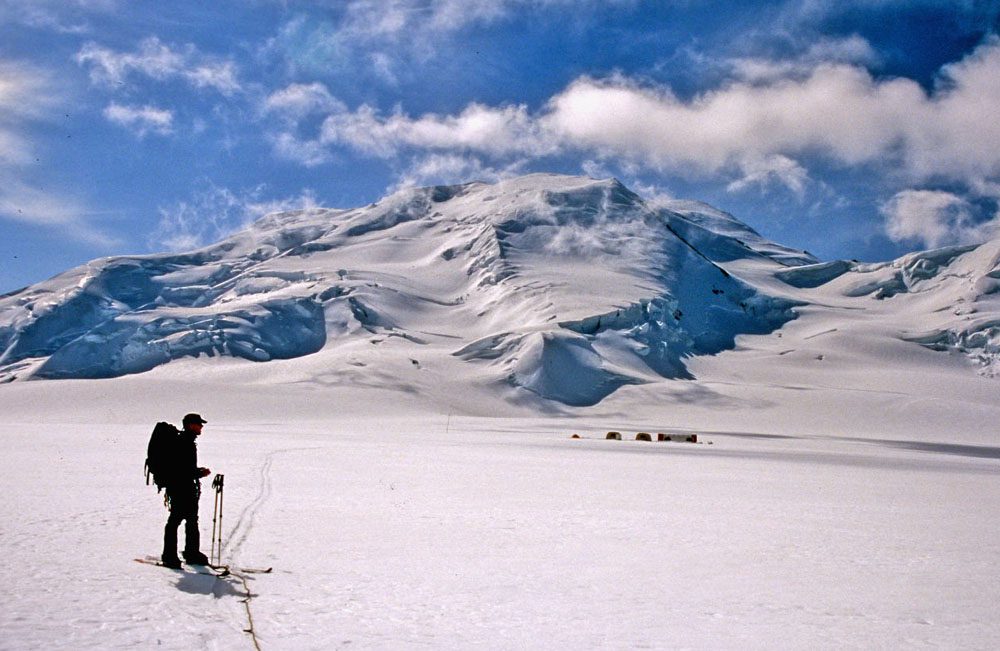
A.L. training in Kluane National Park.
SH: That’s awesome. Hey AL just because this was a little bit of a different experience from most people, do you want to talk a little bit about the wolf darting in Banff?
AL: I can tell you a story. The one I was involved in we were darting wolves on the pasture out by Scotch Camp and it was (Mark) Hebblewhite and Todd Shury in the machine and I was the back up. Lance Cooper was flying the old RLK long ranger. They darted this one wolf and it ended up running up a cliff face south of the cabin. So we flew up there, and it was in a precarious spot, on a large bench in this cliff band, but definitely not in a great place for it to recover. It was Hebblewhite’s first wolf so he took a bit of time trying to get the collar fitted, and doing all the measurements and what not. Todd (Shury) was there and Lance had landed above us and was looking down. We decided we would have to get this wolf out of here and the only way we could get him out was to climb him up the cliff but we didn’t have any ropes so we sent Lance back to the cabin to see what he could scrounge up. He found a bunch of odds and sods of ropes and tied them all together and then tied them to a tree on top of the cliff. I decided I could negotiate my way up this cliff band with this big wolf in a backpack. We had his head covered with a headband to keep his eyes closed and had lightly bound his front legs. Anyway, it had been quite a while since they had drugged the wolf and I started bat-manning my way up this cliff, hand over hand climbing with this wolf on my back. I can actually prove it, because Todd actually has a video tape of me doing it. Anyway, halfway up the wolf starts to wake up and I look over and I can see he’s moving his legs, and he’s got the rope that we had around his legs off, and he’s moved or brushed the eye covering off, and he’s looking at me as we’re climbing up this cliff, he’s looking around. He’s not struggling, I think he’s thinking it’s a bad dream or something. I’m struggling my way up this cliff and when I get close to the top, Lance had secured another chunk of rope and he reached down and grabbed the wolf and the pack off my back, and dragged it up on top so now I can climb a lot easier. As I got up to the top, I got up just in time to see the wolf struggle out of the pack and trot off.
SH: That’s a great story.
AL: Yes, Todd liked telling that one on the immobilization courses.
SH: What did you like about being a Warden? What didn’t you like about being a Warden?
AL: Obviously the variety of the job and being outside. When I came to the Warden Service I was pretty much a blank slate. I didn’t have any expertise at all. I had enough experience or whatever it took to get my foot in the door. But by no means was I a horseman or a rescue technician or any of those things that I ended up doing. So I enjoyed the variety of aspects of the job that you could get into then, because it wasn’t stove piped. You could really float around and experience so many things. Some people found their niche and got that specialized role but I liked the generalist. I liked being good at everything, but maybe not great, but good. So I really liked that. And then of course the comradery. The feeling of being part of a fellowship. I called it a brotherhood, a brotherhood or sisterhood, it was a group of us, because by the time I was in it, we had a lot of super capable women in the Warden Service as well. But that feeling of fellowship was really important to me.
SH: What didn’t you like about being a warden?
AL: Just the obvious politics. It always seemed like there was an ‘us’ and ‘them’ mentality between the Warden Service and upper management and obviously it became more pronounced as the gun issue became more prevalent. Changes happened in management and the structure as well, so I didn’t like the politics.
SH: What are some of the more memorable events of your Warden Service career?
AL: I can tell you a few stories. When I moved from The Crossing into town in Banff, there was a sheep investigation going on. They thought somebody was poaching sheep or sheep horns or something, so the whole Warden Service there were tied up. They were doing 24 hour stake outs in this one spot. So I showed up and they needed somebody to be the duty warden. It was my first day working in the town and I got this call. A woman had been trapped in her house basically for three days, this is in November or early December. This bull elk had taken up residency in her yard and wouldn’t let her out. So I thought, whatever, this is no big deal. I can chase an elk out of her yard. I’ve had lots of experience working with elk. When I worked for Alberta Environment we had elk. Elk Island, obviously we were handling elk. So I though this is no big deal. But this bull elk is really, really stubborn. I tried moving him by myself with my hands, and yelling at him, but no he came charging at me. I tried the old hockey stick with the tape on it, but no, just would attack the stick and come at me. I think we’d just started moving into paint balls, so I tried paint balling with it, but no that didn’t work, so I ran out of options.
I thought maybe I could get someone else to come help me, or a couple of people. But it was busy, so when I called into Dispatch to ask for a little help with this elk, the only person around was (Marc) Ledwidge and he just happened to be going home for lunch and he was driving the brand new, I think it was the first white warden truck we had in Banff. It was a brand new suburban at the time. So he came and helped me, and we both tried moving the elk, but the elk kept coming at us. But now Marc has got this figured out. We’re going to jump into the suburban we’ll just drive into the yard and put the siren on and scare him that way. So we drive in, and he puts the siren on and the elk attacks the front of the truck. He rips out the grille, scrapes up the front of the hood, and Marc is pretty peeved about his truck getting wrecked. So he asks “Horton, you got a shotgun in that truck?” “Yup”. “Do you know how to use it?” “Yup”. “Kill it”. “Okay no problem.” So I shot this elk.
Later on, Glen (Peers) was the wildlife warden and he’d heard about this episode. He didn’t know all the details obviously, but he and Marc were playing hockey that night. He said “I’m going to talk to (Bob) Haney (Chief Warden) and we’re going to get rid of that Horton. He’s a wildcard and he’s not following the rules. I’m going to get him kicked out.” So Marc says “Well Glen, I told him to do it, and if he hadn’t had done it I would go to Haney and get him kicked out for not obeying what I told him to do.” So Marc sure saved my bacon there.
